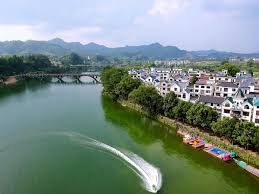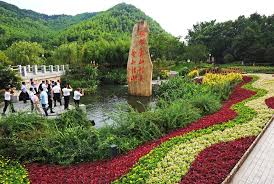15 years on, sustainability shines brighter with Xi’s hallmark green development saying

Beijing: “Lucid waters and lush mountains are invaluable assets,” the famous line put forward by President Xi Jinping in his earlier days as Communist Party chief of Zhejiang in 2005, has evolved into a guideline behind China’s quest for a greener future through sustainable development.
Fifteen years on, the visions of Xi, who is also general secretary of the Communist Party of China Central Committee and chairman of the Central Military Commission, about growing a rich trove of the “invaluable assets” have witnessed the positive change of landscape, as well as far-reaching harmonization of a huge economy and the bountiful nature.

China saw a significant improvement in its ecological environment amid anti-pollution efforts and a push for green development. Its efforts in promoting green ecology have earned global recognition. The United Nations Environment Programme decided to promote China’s philosophy of ecological progress in February 2013 and released a report on China’s strategies and practices in the field in 2016.
With Xi at the helm, China’s green development has picked up the pace and become more prominent in top-level designs and master plans.
During the past few years, the country has adopted more innovative financing models to support a sustainable economy. It has further developed its green bond market, established a national green development fund and launched a national carbon market.
As Xi has required, more should be done to accelerate institutional innovation and strengthen the implementation of institutions to help form a green way of production and living.
Amid efforts to improve mechanisms, the country solicited public opinions on revising the green bond catalog in May and intended to exclude “clean utilization of fossil fuels” from the list, marking an important step in its increasing alignment with global standards.
This was followed by the announcement to establish the country’s first dedicated company to raise funds for green development. In July, the National Green Development Fund Co., Ltd. was put into operation with a total registered capital of 88.5 billion yuan (about 12.75 billion U.S. dollars), aiming to support areas such as pollution control, conservation of energy and resources, green transportation and clean energy.
Another innovative exploration of China is the development of a national carbon emission trading market, which was launched in 2017 after piloting it in seven provinces and cities in 2011. The idea behind its launch was to explore market-based mechanisms to control greenhouse gas emissions.
When Xi revisited Yucun Village in Zhejiang, where he first put forward the “waters and mountains” line, he reiterated that economic development should not be achieved at the expense of the ecological environment.
Analysts expected the country to outline institutional guarantees and greater ambition for green growth in its forthcoming 14th Five-Year Plan for the social and economic development in the 2021-2025 period, which will steadfastly carry forward concepts and approaches embodied by the hallmark line.
Liu Shijin, deputy director of the economic committee of the National Committee of the Chinese People’s Political Consultative Conference, the top political advisory body, looks forward to the establishment of a green development framework during the period, as it will be central to efforts in advancing an all-around transition in development mode.
Liu said green development is pivotal to revive the virus-hit economy and the country’s high-quality development, adding that the country should incorporate the notion into its “new infrastructure” drive, prioritize the development of renewable energy, and energize investment and consumption related to the green sector.
Zou Ji, president of Energy Foundation China, deemed the COVID-19 epidemic as “an unexpected new background” for the 14th Five-Year Plan, as well as an opportunity to expedite its low-carbon transition. “This is a window of opportunity for transformation that cannot be lost,” Zou said.
